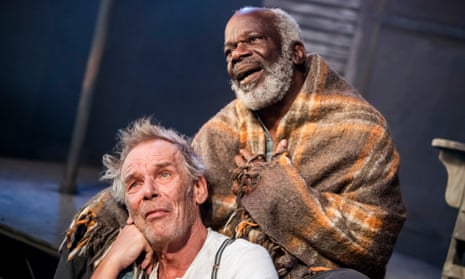The men in Sam Shepard’s dramas often find themselves stranded in the middle of nowhere and tortured by a maelstrom of unspoken emotions in their inescapable solitude. Shepard spoke of his interest in “aloneness” and referred to it as a Beckettian state of “banishment, exile, being cut away”. Ages of the Moon, first staged in 2009 and now premiering in the UK, is a tightly focused study of this existential aloneness – even if it parades as a grumpy bromance between two ageing men. Ames (Christopher Fairbank) and Byron (Joseph Marcell) are friends of 50 years who have reunited to appraise their lives. They do so over a bottle of bourbon on a front porch (designed by Holly Pigott) that is filled with dust and gloom, and looks out on an imagined expanse of empty sky.
Ames is seemingly the needier of the two: an infidelity that he describes as a “minor blow job” from a woman whose name he can’t remember has cost him his marriage. Byron has been summoned for emotional support but sits in judgement, withholding his own story … or so it appears at first.
As power dynamics shift, the play turns from marital meltdown, male rivalry and armchair priapism to the bigger issue of ageing and mortality.
Banishment is central to this theme, and here becomes a consequence of old age: facing up to death is its own state of terrifying exile, Shepard suggests through these unravelling men.
The play’s echoes of Beckett are perhaps too glaring: Fairbank channels Beckett’s tragicomic, combustible misery in his sockless spats and braces, while Marcell is mellower. Like Vladimir and Estragon, the men are tied to each other in this wilderness, waiting not for Godot but for the eclipsing moon to bring them mystical redemption.
Byron is a less developed character – a listener who feeds off Ames’s stories – so it is unexpected when the play turns to the bigger drama of his heartbreak and loss. This narrative twist feels a little belated, but Marcell brings melancholy power to his performance.
Their bickering, as they gulp down the booze, is loudly delivered and crescendos in an outbreak of proxy violence when Ames shoots the fan in anger. But even so, there is not quite enough voltage to the menace.
Despite this, for an hour-long play, Ages of the Moon travels a fair distance in its themes. There are some almost heartstopping moments, and it contains laughs, too, but the comedy is gentle rather than darkly savage. This feels distinctly like Shepard in tone, as he picks apart the frailties of his tormented old men.
At the Vaults, London, until 24 November.

Comments (…)
Sign in or create your Guardian account to join the discussion